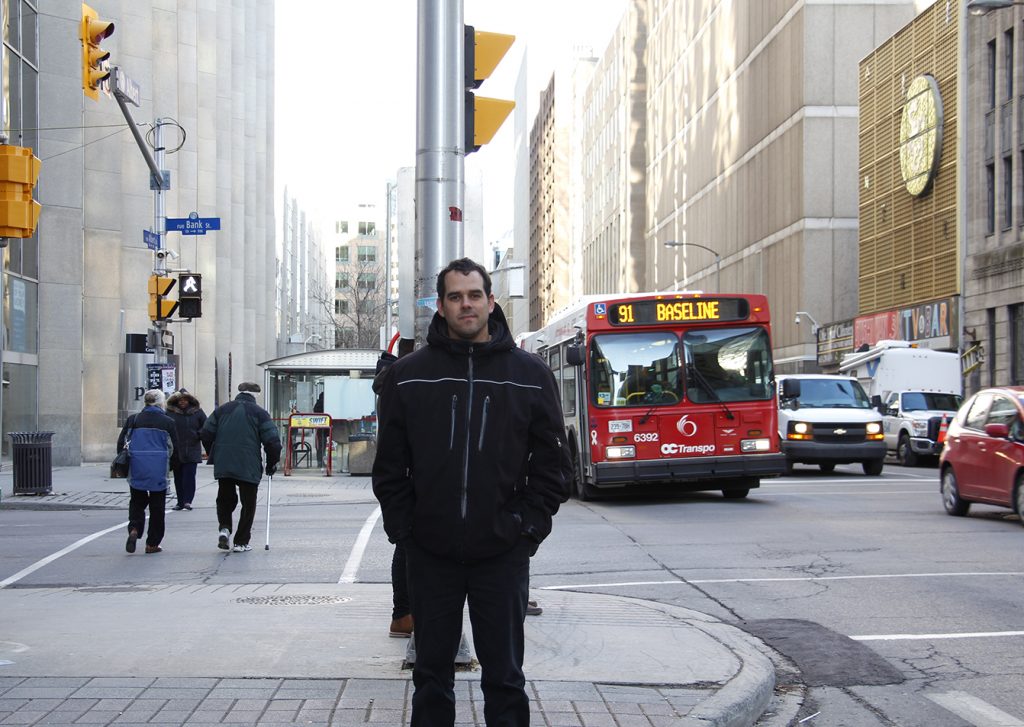City to revamp Albert, Slater
By Tiffany Edwards
The City of Ottawa is proposing a major redesign of the Albert and Slater Street corridors, along with the Mackenzie King Bridge, and inviting input from the public.
An open house displaying the proposed changes to the heavily travelled downtown streets was scheduled for Nov. 28. The redesign aims to create more functional roadways that also accommodate on-street parking, bike parking, green spaces and walkways.
The redesign has the potential to improve the streets for all users — as long as the public keeps pressure on the city to make smart choices, said Trevor Haché of the Healthy Transportation Coalition.
“This is really an opportunity that the city needs to take advantage of to the full extent.”
Many of the buses running along Albert and Slater will be taken off the road when the LRT line is complete next spring, freeing space to improve the roadway environment for walking and cycling, according to the project blueprint.
Based on the 2013 Downtown Moves proposal, the planned redesign from Empress Avenue in the west to Waller Street in the east aims to create more vibrant, accessible and safe streets for people of all ages and abilities. This includes the street-level spaces around downtown LRT stations, which are projected to see 47,000
commuters every morning.
Preliminary timelines show reconstruction of the streets beginning in late 2018 or early 2019 and staged over three years, according to Vivi Chi, manager of transportation planning for the City of Ottawa.
Changes to the street design between Bay and Waller are projected to cost $6.4 million over the three-year span of the project, Chi said. The budget for the west end of Albert and Slater – between Empress and Bay – is still to be determined.
Chi said the biggest challenge comes from the west end of the project area, which will include full road, water and sewer renewal. “The objective is to create an ultimate ‘Complete Street’ design that improves circulation for all users, of all abilities.”
Complete Street concepts, including cycling lanes at sidewalk level and various traffic calming measures, have been implemented in recent years along Churchill Avenue in Westboro and Main Street in Old Ottawa East.
Giving more safe spaces to pedestrians and cyclists should lead to an increase in the number and frequency of people walking and biking, Haché said. “When you improve environments (around the city)…people want to linger on those streets.”
Improved cycling and pedestrian infrastructure that leads more people to choose non-polluting transportation options is a key part of the city’s strategy to reduce overall carbon emissions in the face of global climate change and to improve downtown air quality.
To help identify public concerns, the city is engaging with community groups, its accessibility advisory committee, and adjacent business owners before the project gets under way, said Chi.
Brian Wade, chair of the advisory committee, which represents the interests of citizens with mobility limitations and other challenges, said the group is very concerned with redevelopments such as the ones envisioned for Albert and Slater.
Sidewalk width is a much-debated topic because people need enough space for motorized aids, such as electric wheelchairs, without having to dodge garbage bins, signs or trees, he said.
Wade said bike paths can be a major concern, as well. Many road redevelopments are putting bike paths on the same level as sidewalks, which can create issues for those with vision loss and those who use service dogs, he noted.
“The dogs are trained to go (near) the curb, which sometimes puts (them) right in the way of oncoming bike traffic,” said Wade. “Dogs are not trained to follow lines, see green-colour paint, or see the different patterns in the concrete.”
Wade said he hopes the redesign will fix those kinds of problems on streets such as Bronson and Slater because they can be hard for people with vision loss to navigate.
Ultimately, the accessibility advisory committee “wants to ensure that Ottawa is inclusive and accessible to all,” said Wade.

